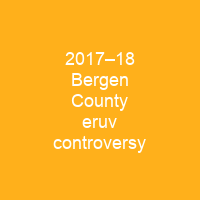Mahwah, Upper Saddle River, and Montvale in Bergen County, New Jersey, in the United States, opposed extension of an eruv within their borders. An eruv is a land area surrounded by a boundary of religious significance, often marked by small plastic pipes attached to utility poles. The demarcation permits Orthodox Jews to push or carry objects within the eruv on the Jewish Sabbath.
About 2017–18 Bergen County eruv controversy in brief

In Teaneck, home to large numbers of Orthodox Jews, an eruV has existed since the 1970s with little controversy, and, as the Jewish population increased, was extended to nearby Bogota and Bergenfield. There are many requirements for eruvin; the Talmud devotes an entire tractate to the subject. An operating eruv allows observant Jews to carry prayer books from home to synagogue on Shabbat, or to push strollers or baby carriages. The poles are regarded as doorposts, and are marked by solid objects such as lengths of twine or of plastic pipe, which run from near the ground to just below the wires. The space between the poles is considered as doorways, topped by lintels, the telephone or power wires, and is known as the “doorway” The eruvin in Ber gen County are in Fair Lawn and in Paramus. A previous instance in which eruv had been constructed, and had been challenged by local authorities, occurred in Tenafly in the eastern part of the county. Attempts by municipal authorities to ban eruvin had failed when challenged in the federal courts, and the settlement after a six-year battle obliged the borough to pay USD 325,000 for the legal costs. In a 2006-year conflict over whether an eruvin should be allowed to continue, the municipality has lost and Orthodox Jews in Rocklands County gained a license to build one. In 2015, the eruvin association gained permission to build a new one in Rockland County.
You want to know more about 2017–18 Bergen County eruv controversy?
This page is based on the article 2017–18 Bergen County eruv controversy published in Wikipedia (as of Nov. 02, 2020) and was automatically summarized using artificial intelligence.







